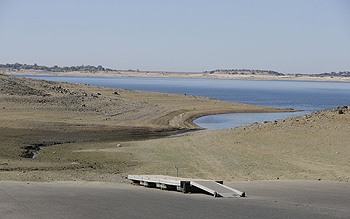The simplest solution to California’s drought crisis

By Nick Zaiac
It’s dry, and it has been for a long time. The most recent data from the U.S. Drought Monitor show the entire state of California in drought conditions, and fully 58 percent of the state is categorized as “Exceptional Drought,” the worst category tracked.
Worse, the drought is actually weakest in the places few people live, the deserts near the Arizona border. Water is scarce, tensions are high and no day goes by without some new fix to the “water problem.”
BONE DRY: A dock sits high and dry at the end of a boat ramp yards away from the edge of Folsom Lake near Folsom, Calif.
The answer to this problem isn’t as complex as people make it out to be. At least, that’s the opinion of University of California Santa Barbara professor and water policy expert Gary Libecap says in a recent piece in the journal Regulation. He argues that strengthening property rights and water measurement, along with providing water trading platforms and other measures could alleviate scarcity in the face of drought conditions.
The key to all of this is allowing for well-defined property rights to water. With property rights, the price of water can react more directly when the supply of it changes. Better, Libecap notes that these property rights are already largely established. All that needs to be done is tweak the system that is already in place.
What California needs is a robust market for water. This means more trading of water rights, allowing those who demand them most to pay the fair-market value for them. In times where water is scarce, prices will rise, and those who place the most value on it will use it. There is more incentive to conserve water when prices are high. When reservoirs are full and water is relatively plentiful, the price will fall, bringing with it more use, probably in the form of farming more land, which consumes 80 percent of the state’s water.
Right now, the discrepancy between the price of water to farmers and those of urban consumers is high. Farmers in the Turlock Irrigation District pay $30 per acre-foot of water, but could sell these water rights for $2,000 per acre-foot to a nearby water district. This disparity is a result of the inability to trade water rights efficiently.
Well-defined property rights means some water will probably move from uses in agriculture to others like drinking. It means less marginal land will be farmed using irrigation, which would either be left fallow until years where water is especially plentiful, or crops that need less water could be farmed. Urban consumers tend to value water highly and are more likely to demand high quality water. This system makes water quality improvements more likely, and because of the comparatively high demand, they are the least likely to face usage restrictions when water is scarce (while they’ll pay more for the water they use).
People who hold water rights such as farmers will benefit from a more easily accessed way to sell their water rights when someone else will pay a premium for them. Even environmentalists can win, with groups purchasing water rights to preserve stream flows. This happens in Oregon, where the Freshwater Trust augments stream flows with private water rights.
Water is a precious resource. In a drought-prone state, we need to find the absolutely best way to use what water we have. The pieces are in place to fix California’s water problem, we just need to put them together.
Ending community vetoes over water rights trades would be a start, preventing the problems faced by cities like San Diego in their quest for more water for residents. The public trust doctrine has placed a burden on private water rights holders, from farmers to cities like Los Angeles and should be ignored in favor of recognition of the current system of water rights. Finally, the state could give more flexibility to local water rights holders to buy and sell their water rights. No new auctions for water or reallocation of water rights is needed. Property rights make for less water scarcity. It’s not a perfect answer to the water crisis, but definitely the best option available.
Nick Zaiac is a Young Voices Advocate and researcher based in Washington, D.C.







